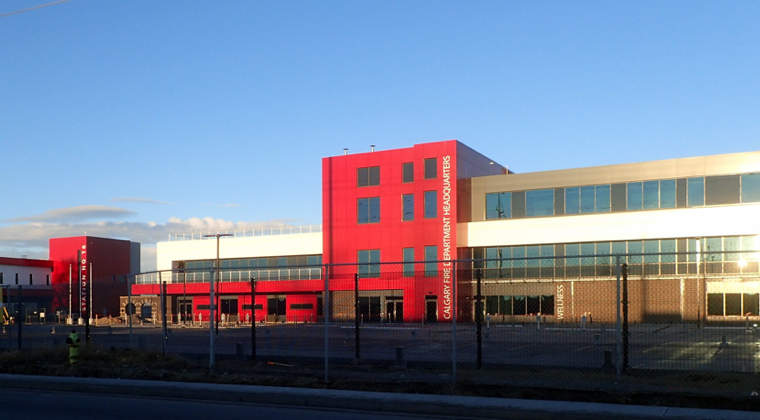ALEC Clears File Management Hurdles on Large Construction Projects
With Egnyte’s cloud-hosted system, the firm accelerated site startup and remote collaboration–even on complex projects involving large files.
ALEC’s First Project in Egnyte:
- 250,000-square-meter built up area
- 500+ stakeholders across multiple departments
- 28 terabytes of project data

Managing major construction projects during a global pandemic is no picnic. It requires dealing with enormous data volumes, facilitating collaboration among myriad stakeholders, and erecting large and complex edifices–all while health restrictions prevent most people from actually meeting on a job site.
After implementing Egnyte’s document management platform, the large UAE-based firm ALEC Engineering & Contracting expertly navigated these challenges, achieving rapid site startup, seamless remote collaboration, and easy management of large files.
Challenge: Project Complexity Outpaces Legacy Software
For ALEC, large and complex construction jobs are the norm, requiring collaboration among hundreds of staffers, often spread across various departments and offices. It also entails managing Revit files up to 11 gigabytes in size.
ALEC’s on-premises file sharing network posed challenges in several key areas when managing these projects:
- Extensive project setup
At the start of each project, the system required extensive and time-consuming on-site prep work. “This involved setting up a physical server at each site, installing the necessary software, and building a folder structure for managing files,” explains Najib Dalank, Head of IT at ALEC. “Then we had to secure the necessary storage and establish security policies. And we had to do daily manual content backups on each system to meet the seven-year archival requirements of our projects.” - Remote document management
Without cumbersome workarounds, team members could only access the on-premises server while on site. “We had to virtualize machines to enable users to access content using the local network, and if we wanted to share a file with an external partner, we had to download it and then reupload it to a different platform,” Dalank explains. Dewald Smith, Project Director at ALEC, adds: “Even then, sometimes files were so large we had to add them to Dropbox and send them via a link, which would often expire and need to be resent.” - Outdated documents
With various stakeholders managing files on multiple local servers simultaneously, it was hard for someone to know if the file they were looking at was fully up to date.

Solution: Unify Dispersed Stakeholders Through Cloud Adoption
The ALEC team evaluated Egnyte as a cloud-hosted alternative to their on-premises file sharing network. “We started with a small proof of concept that went well,” explains Dalank. “We then used Egnyte for a leisure mega-project we would soon be developing.”
Soon after migrating data into Egnyte, it became clear that Egnyte’s cloud infrastructure was the answer to the issues the previous system had created. “Once our content was in the cloud, our team could immediately access both large and small files from anywhere with an internet connection, without the need for VPN connect,” says Dalank. “Content updates were immediately synced, files were automatically backed up, and it was easy to provision the right level of file access to stakeholders based on their role.”
These features were impressive enough. But perhaps what clinched ALEC’s decision to move forward with Egnyte was Egnyte’s Storage Sync product. “We had previously tried other systems but kept running into synchronization issues between cloud and local versions of files, even small ones,” says Dalank. “But we had great synchronization results with Egnyte. We were able to upload and download terabytes of data via Storage Sync, and it worked perfectly.”
As the project moved forward, Egnyte’s cloud infrastructure and file access controls made sharing and collaborating on files easy for internal and external stakeholders alike. As Smith explains: “Staff can access the latest versions of design documents on their iPads rather than printing them out, gathering on site to review them, and hoping they’re still up to date. And we can send subcontractors and clients a link to view all the reports and other materials they need, knowing we have the controls in place to prevent people from accessing the wrong things.”
Describing Egnyte’s impact on project startup, Dalank says: “With everything in the cloud, we no longer had to implement a ton of local infrastructure at each project site. Where it used to take three or four weeks to get everything ready, Egnyte allowed our team to start collaborating in just one day, whether remotely or on location.”

Benefits: A Steady Ship as Project Size and Complexity Grow
In the midst of the mega-project, COVID hit. But with Egnyte’s cloud infrastructure streamlining remote collaboration and file sharing, the project was hardly affected. “Only Operations were allowed to visit job sites during COVID,” Smith explains. “But Egnyte enabled us to keep working together anyway. We could access the cloud remotely and do whatever we needed.”
Dalank adds a note on the team’s experience navigating the Egnyte platform: “The biggest piece of feedback we’ve gotten is that Egnyte offers the same mapped drive experience our users recognized from the previous system. It’s so intuitive for people to find the files they need, which has been a huge driver of user adoption.”
And it’s not just the ALEC team who has benefited. With smoother collaboration, fewer content silos, and stronger business continuity, ALEC’s clients are happier as well. “We’re able to collaborate with clients with more transparency, and that has really built trust and strengthened those relationships,” Smith explains. “We can tell them: ‘Here’s a link you can use to access our platform and all the reports you need.’”
Since the mega-project opened to the public in 2023, Egnyte has been ALEC’s go-to document management system and is currently in use in about half a dozen major projects. ALEC is now looking at myriad other areas in which their partnership with Egnyte could be beneficial. “We’ve already successfully pushed Egnyte for a big project with one of our partners in Saudi and signed a new enterprise agreement for 1,000 licenses with Egnyte, which has been transformational,” comments Dalank. “Now we’re deep in the weeds exploring how Egnyte can serve us in areas from workflows to integrating with Microsoft Teams to AI to information security–we’re going for ISO 27001 compliance in 2024, and Egnyte will be critical for that.”
Summing up his experience, Smith says, “Our projects, and the data involved with them, are always becoming more complex. But with Egnyte, there’s no downtime, or waiting period to access content, or complaining from the team. That makes it easy for us to take on increasingly complex projects more quickly and effectively. If you have a large staff, or people collaborating remotely, or large data volumes, or issues with access controls, Egnyte is the tool for you.”
At a Glance
Industry
Architecture, Engineering, & Construction
Location
Dubai, UAE
Number of Employees
5,900
Egnyte Products
Platform Enterprise Lite
Learn More

